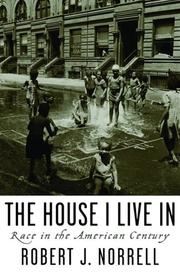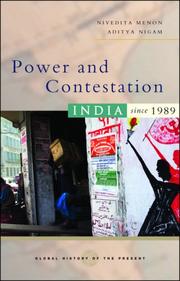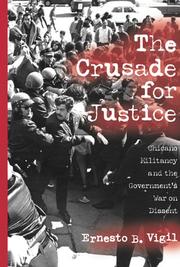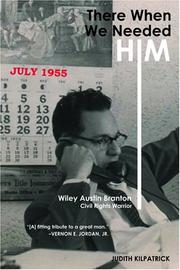| Listing 1 - 10 of 136 | << page >> |
Sort by
|
Book
ISBN: 0809387174 1299050565 9780809387175 9780809328376 0809328372 9781299050563 Year: 2008 Publisher: Carbondale Crab Orchard Review :Southern Illinois University Press
Abstract | Keywords | Export | Availability | Bookmark
 Loading...
Loading...Choose an application
- Reference Manager
- EndNote
- RefWorks (Direct export to RefWorks)
Book
ISBN: 0190259728 1282977784 9786612977787 0199750602 Year: 2011 Publisher: Oxford ; New York : Oxford University Press,
Abstract | Keywords | Export | Availability | Bookmark
 Loading...
Loading...Choose an application
- Reference Manager
- EndNote
- RefWorks (Direct export to RefWorks)
The Civil Rights movement that emerged in the United States after World War II was a reaction against centuries of racial discrimination. In this sweeping history of the Civil Rights movement in Atlanta--the South's largest and most economically important city--from the 1940's through 1980, Tomiko Brown-Nagin shows that the movement featured a vast array of activists and many sophisticated approaches to activism. Long before ""black power"" emerged and gave black dissent from the mainstream civil rights agenda a new name, African Americans in Atlanta debated the meaning of equality and the step
Segregation --- Civil rights movements --- Law and legislation --- History. --- History --- Civil liberation movements --- Liberation movements (Civil rights) --- Protest movements (Civil rights) --- Human rights movements --- Desegregation --- Race discrimination --- Minorities

ISBN: 0190281855 1280759801 0198023774 1429420480 9781429420488 0195073452 9780195073454 9786610759804 6610759804 0195304527 9780195304527 9780190281854 9781280759802 9780198023777 Year: 2005 Publisher: Oxford ; New York : Oxford University Press,
Abstract | Keywords | Export | Availability | Bookmark
 Loading...
Loading...Choose an application
- Reference Manager
- EndNote
- RefWorks (Direct export to RefWorks)
Chronicles American race relations over the last one hundred and fifty years and sheds new light on the ideologies, from white supremacy to black nationalism, that have sculpted the landscape of race since the Civil War.
Civil rights movements --- African Americans --- Civil liberation movements --- Liberation movements (Civil rights) --- Protest movements (Civil rights) --- Human rights movements --- History. --- Civil rights --- History --- United States --- Race relations

ISBN: 1783601949 1848138180 1282903381 9786612903380 9781848131641 1848138172 9781848138179 9781848131644 184813164X 1848138156 9781848138155 9781848138162 1848138164 9781848138155 1848138156 1350220833 9781350220836 9781783601943 9781848138186 9781282903388 6612903384 9781842778142 9781842778159 9781552662397 Year: 2010 Publisher: London, England : [London, England] : Zed Books, Bloomsbury Publishing,
Abstract | Keywords | Export | Availability | Bookmark
 Loading...
Loading...Choose an application
- Reference Manager
- EndNote
- RefWorks (Direct export to RefWorks)
Iran, the Green Movement and the USA presents the paradox that the USA faces in dealing with Iran over its nuclear armament: negotiate, and legitimize Ahmadinejad's otherwise troubled presidency; resort to sanctions or military strikes, and altogether destroy the budding civil rights campaign of the Green Movement. Either way, as leading Iranian scholar Hamid Dabashi argues, the Islamic Republic will become even stronger.
Book
ISBN: 1283538970 9786613851420 0739143603 9780739143582 0739143581 9780739143605 9781283538978 6613851426 Year: 2012 Publisher: Lanham [Md.] : Lexington Books,
Abstract | Keywords | Export | Availability | Bookmark
 Loading...
Loading...Choose an application
- Reference Manager
- EndNote
- RefWorks (Direct export to RefWorks)
"This edited collection focuses on the philosophical ideas, constructive engagement, and lasting contributions of Charles H. Houston, a legal scholar activist who played an important role in the civil rights movement"--
African Americans --- Civil rights movements --- Civil liberation movements --- Liberation movements (Civil rights) --- Protest movements (Civil rights) --- Human rights movements --- Civil rights --- History. --- United States --- Race relations
Book
ISBN: 1604861487 1604861479 1604860359 1306057760 Year: 2008 Publisher: Montreal, Quebec : Oakland, CA : Kersplebedeb ; PM Press,
Abstract | Keywords | Export | Availability | Bookmark
 Loading...
Loading...Choose an application
- Reference Manager
- EndNote
- RefWorks (Direct export to RefWorks)
Let Freedom Ring presents a two-decade sweep of essays, analyses, histories, interviews, resolutions, People's Tribunal verdicts, and poems by and about the scores of U.S. political prisoners and the campaigns to safeguard their rights and secure their freedom. In addition to an extensive section on the campaign to free death-row journalist Mumia Abu-Jamal, represented here are the radical movements that have most challenged the U.S. empire from within: Black Panthers and other Black liberation fighters, Puerto Rican independentistas, Indigenous sovereignty activists, white anti-imperialist
Political prisoners --- Civil rights movements --- History --- Civil liberation movements --- Liberation movements (Civil rights) --- Protest movements (Civil rights) --- Human rights movements --- Prisoners of conscience --- Prisoners
Book
ISBN: 1610457498 Year: 2017 Publisher: [Place of publication not identified] : Great Neck Publishing,
Abstract | Keywords | Export | Availability | Bookmark
 Loading...
Loading...Choose an application
- Reference Manager
- EndNote
- RefWorks (Direct export to RefWorks)

ISBN: 0299162230 0585252475 9780585252476 0299162206 0299162249 9780299162207 9780299162245 Year: 1999 Publisher: Madison University of Wisconsin Press
Abstract | Keywords | Export | Availability | Bookmark
 Loading...
Loading...Choose an application
- Reference Manager
- EndNote
- RefWorks (Direct export to RefWorks)
Mexican Americans --- Civil rights movements --- Chicanos --- Hispanos --- Ethnology --- Civil liberation movements --- Liberation movements (Civil rights) --- Protest movements (Civil rights) --- Human rights movements --- Civil rights --- History --- Politics and government. --- United States --- Southwest, New --- Sunbelt States --- Politics and government --- Ethnic relations.
Book
ISBN: 067441649X 9780674416499 9780674050297 0674050290 Year: 2014 Publisher: Cambridge, MA
Abstract | Keywords | Export | Availability | Bookmark
 Loading...
Loading...Choose an application
- Reference Manager
- EndNote
- RefWorks (Direct export to RefWorks)
The Civil Rights Revolution carries Bruce Ackerman's sweeping reinterpretation of constitutional history into the era beginning with Brown v. Board of Education. From Rosa Parks's courageous defiance, to Martin Luther King's resounding cadences in "I Have a Dream," to Lyndon Johnson's leadership of Congress, to the Supreme Court's decisions redefining the meaning of equality, the movement to end racial discrimination decisively changed our understanding of the Constitution. Ackerman anchors his discussion in the landmark statutes of the 1960's: the Civil Rights Act of 1964, the Voting Rights Act of 1965, and the Fair Housing Act of 1968. Challenging conventional legal analysis and arguing instead that constitutional politics won the day, he describes the complex interactions among branches of government--and also between government and the ordinary people who participated in the struggle. He showcases leaders such as Everett Dirksen, Hubert Humphrey, and Richard Nixon who insisted on real change, not just formal equality, for blacks and other minorities. The civil rights revolution transformed the Constitution, but not through judicial activism or Article V amendments. The breakthrough was the passage of laws that ended the institutionalized humiliations of Jim Crow and ensured equal rights at work, in schools, and in the voting booth. This legislation gained congressional approval only because of the mobilized support of the American people--and their principles deserve a central place in the nation's history. Ackerman's arguments are especially important at a time when the Roberts Court is actively undermining major achievements of America's Second Reconstruction.
Constitutional history --- Constitutional law --- Civil rights movements --- Civil liberation movements --- Liberation movements (Civil rights) --- Protest movements (Civil rights) --- Human rights movements --- History. --- Constitutional history-United States. --- Constitutional law-United States. --- Civil rights movements-United States-History.

ISBN: 1610754220 9781610754224 1557288488 9781557288486 Year: 2007 Publisher: Fayetteville University of Arkansas Press
Abstract | Keywords | Export | Availability | Bookmark
 Loading...
Loading...Choose an application
- Reference Manager
- EndNote
- RefWorks (Direct export to RefWorks)
Civil rights movements --- African American lawyers --- Civil liberation movements --- Liberation movements (Civil rights) --- Protest movements (Civil rights) --- Human rights movements --- Afro-American lawyers --- Lawyers, African American --- Negro lawyers --- Lawyers --- History --- Branton, Wiley Austin,
| Listing 1 - 10 of 136 | << page >> |
Sort by
|

 Search
Search Feedback
Feedback About UniCat
About UniCat  Help
Help News
News